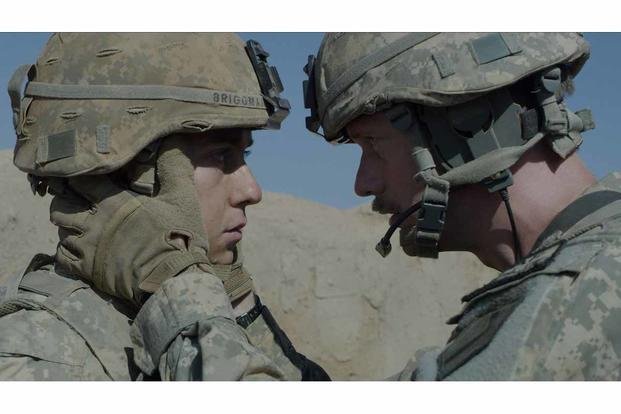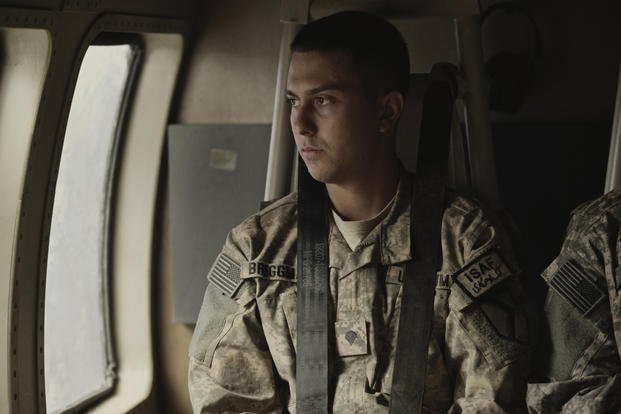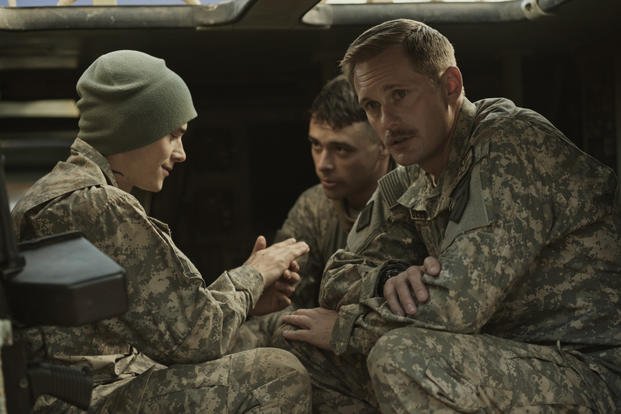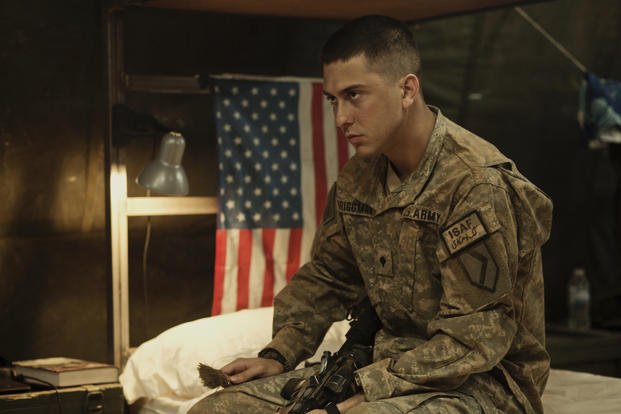"The Kill Team" is a new feature film written and directed by Dan Krauss, the same guy who made the acclaimed and controversial 2013 documentary of the same name. The documentary detailed the 2010 U.S. war crimes known as the Maywand District murders, and the new feature is a dramatic fictionalization of the story.
Although Krauss' feature is "fictionalized," that's because he gives everyone a new name in his movie version. There are minor changes to the story, but it mostly follows the facts as presented in the original documentary.
"The Kill Team" focuses on the story of Andrew Briggman, a soldier based on the documentary's most sympathetic figure, Adam Winfield. Briggman/Winfield tries to report the questionable behavior going on in his unit, but ultimately fails to deliver his message and gets caught up in the civilian murders that constituted a war crime.
Nat Wolff (the imprisoned brother in "Semper Fi") stars as Briggman, and Alexander Skarsgård delivers a convincingly menacing performance as Sgt. Deeks, a leader who has truly lost his way.
"The Kill Team" feature tells the story in an understated way and leaves out the courtroom/prosecution angle entirely. The movie follows the young soldier through his deployment up until the moment they're arrested.
Both the documentary and feature are tough to watch. Each is interested in the idea that wars can create moral injury in the men and women asked to fight them. No one is purely evil and, despite a few attempts, no one manages to be a hero, either.
Krauss, twice Oscar-nominated for his documentary shorts, took time to speak with us about his quest to make these films and why he understands that they will make some viewers very uncomfortable.

You've spent a long time telling this story, first in a documentary film and now in a feature. What first interested you in this incident?
I first read about the story in the Sunday New York Times magazine in a big cover story about the Kill Team cases. There was a photograph of a young soldier named Adam Winfield with his parents. The caption underneath the photo said something to the effect of "Specialist Adam Winfield who had attempted to alert the military to the atrocities and now is charged himself with a premeditated murder." I remember reading that and just feeling confused but also incredibly curious about how he had started off trying to defend the moral right and ended up somehow accused of committing moral wrong.

For some people, it's not the content of the documentary that's controversial, it's the fact that you even decided to tell the story in the first place.
I completely understand and appreciate that viewpoint. It's certainly not something that gives me joy that some members of the military community feel agitated. With the documentary, I was fortunate enough to have interaction with many service members at screenings who thanked me for touching on a topic that has been difficult for some service members to talk about. At the heart of this is what I hope is a universal truth for a lot of young people: How do they maintain their individuality while being part of a group and remaining loyal to that group.
I'm more interested in questions of human psychology and human morality than whether the military is comprised of people doing good or bad. I'm not by nature a political filmmaker. I hope that people won't mistake this film for a political film. I have no intention of casting a bad light on the military as a whole. Part of my interest in this story is because I have such tremendous respect for service members. In some ways, this movie is a post-mortem discussion of a disaster, and I'm hopeful that members of the military will see it as an opportunity for discussion.
One of the greatest moments in my career came when I was invited to West Point to screen the documentary with Adam Winfield and to have a discussion with the cadets afterward. I was really moved by how willing they were to engage in this conversation. I believe that all the service branches want to learn from these mistakes. They want to do better. No one wants this to happen. I'm hopeful that films like this will at least be a starting point for discussion.
I don't believe that this movie and talking about this incident casts the entire military in a negative light. On the contrary, the focus of the film is on the one soldier who really struggles with how best to safely relate the truth. He wants to act in the moral right. We're following the good guy of the story, for lack of a better term.

Even though he fails in his attempts to stop the others in his unit from committing war crimes, I think we can all empathize with a young person in a very dangerous setting. He's depending on those around him for protection and feels like there is a lack of trust or certainty within that group. In my experience of screening the documentary around the world, I've found that there are a lot of people both military and non-military who can relate to that.
One of the questions that drew me to the story was, "Is this a necessary part of warfare?" War crimes date back to the beginning of recorded history. We're not talking about breaking news. My interest lies in that question, of human psychology.
I think of the psychological experiments from the 1970s, the Milgram and Stanford Prison Experiment where you see that young people in particular are highly susceptible to being guided toward behaviors that they may not normally choose in their ordinary lives. That's something that transcends warfare, that transcends the military, that transcends Afghanistan. I hope people can connect to that fact regardless of their political beliefs or affiliations.
I've had some feedback from someone who served in the same brigade but not the same unit. What he sees as the implication that everybody was smoking dope all the time and that way of telling the story tars men who would've never engaged in this unit's behavior. I understand that there are a lot of reasons why you need to focus the story the way you do, but what would you say to someone who has reservations about the film?
I can 100% understand that response. I can understand that some segment of that population feels upset, perhaps offended that a story would focus on the bad apples, the few bad actors that have besmirched their reputation. That's fair. I don't agree with the idea that this movie will leave people with the impression that all soldiers act this way, that they're all murderous thugs that smoked dope and sat around thinking about ways to kill people.
My movie is a dissection of a tragedy. I'm trying to understand the moving parts and the forces acting on these soldiers. These guys didn't enter the military intending to take out unarmed civilians. Understanding what led them to make these choices is a worthy goal. I don't think there's any liability to the reputation of the military if you're being honest about a disaster.

In a way, other people from Joint Base Lewis-McChord during this time are collateral damage to the story. This unit's actions have cast a cloud over their own service.
I don't mean to amplify that feeling or to poke at their sore spot, but I can understand how painful it is to have a story like this cast a dark shadow over the entire history of the brigade. That's not my intention. I really do feel like the movie is not about this unit. It's not about this brigade; it's not about this branch of the armed services. It's about young people who are trying to find their footing in the world and finding their individuality at odds with the moral direction of the group that they're a part of.
The vast majority of service members serve with honor and dignity. I don't believe a film like this takes away from that sense of respect that we all have for those service members. This is not an anti-war film. It's not an anti-military film. At worst, it's an anti-war crimes film. I would hope that everyone would be on board with that idea.















